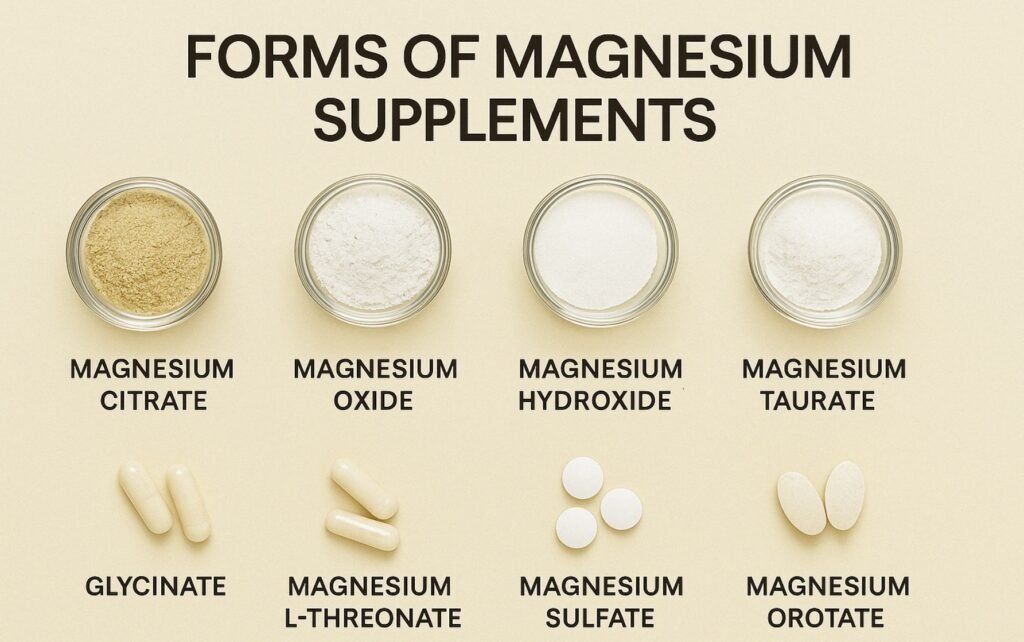Struggling with low energy, brain fog, or muscle cramps? Learn which type of magnesium is right for your needs and how to choose it safely.
You walk into a pharmacy or browse online, ready to improve your health with a magnesium supplement. But suddenly, you’re overwhelmed. Glycinate, citrate, oxide, threonate, what do they all mean? One bottle claims to help you sleep, another boosts your mood. And some say they help with digestion or muscle pain. How do you know which one actually works?
Magnesium is essential for your body. It supports more than 300 biochemical processes that influence energy, sleep, stress, muscle function, mood, memory, and heart health. Yet, studies consistently show that the majority of people don’t get enough magnesium from food alone. Whether from poor diet, depleted soil, chronic stress, or medication use, magnesium deficiency is surprisingly common.
Why Magnesium Deficiency Happens So Easily
Many of us are eating foods that are too processed and low in nutrients. Magnesium is naturally found in leafy greens, legumes, nuts, seeds, and whole grains, but these foods are often underrepresented in modern diets. And even when they’re included, farming practices today mean they contain less magnesium than they did decades ago.
To make matters more complex, stress and certain medications (such as diuretics or proton pump inhibitors) cause your body to lose magnesium more quickly. Gut conditions like Crohn’s also reduce your body’s ability to absorb it properly.
The result? A long list of vague, frustrating symptoms that can easily go misdiagnosed. Think fatigue, sleep disturbances, headaches, constipation, irritability, anxiety, and brain fog.
What Does Magnesium Actually Help With?
Magnesium plays a critical role in nervous system regulation, heart rhythm, muscle contraction, and even how well you sleep. It also helps convert food into energy, making it central to your metabolism and resilience.
Many doctors use magnesium supplements to help people with migraines, perimenopause, constipation, poor sleep, and stress. Some cardiologists even explore its benefits in managing blood pressure and irregular heartbeat, though more human studies are still needed to establish clear guidelines.
In children, magnesium is sometimes used to support sleep and calmness, especially when anxiety and gut issues are involved. However, as with all supplements, the advice is always the same: consult your doctor first.
Best Food Sources of Magnesium
Whenever possible, magnesium should be obtained from your diet. Foods naturally high in magnesium include spinach, chard, pumpkin seeds, almonds, black beans, edamame, quinoa, bananas and even dark chocolate.
These whole foods offer additional benefits, fiber, phytonutrients, and healthy fats which make them more than just magnesium delivery systems. Still, food alone may not always be enough, especially for those with increased needs.
Which Magnesium Supplement Is Right for You?
Magnesium supplements come in many forms, and each works slightly differently in the body. Some are better absorbed, some are calming, and some mainly work as laxatives.
Here’s a simplified guide to help you choose:
| Form | Best For | Notes |
| Magnesium Glycinate | Sleep, anxiety, PMS, perimenopause | Highly absorbable, gentle on the stomach, calming |
| Magnesium Citrate | Constipation, general use | Well absorbed, but mildly laxative |
| Magnesium Malate | Muscle pain, chronic fatigue, fibromyalgia | Supports energy production in muscles |
| Magnesium L-Threonate | Brain fog, memory, focus | Can cross the blood-brain barrier; promising for cognition |
| Magnesium Taurate | Blood pressure, heart health | Combines taurine and magnesium for cardiovascular support |
| Magnesium Sulfate | Muscle soaking, bath relaxation | Limited evidence for absorption through skin |
| Magnesium Orotate | Heart disease, athletic performance | Easily absorbed; expensive and less studied in humans |
| Magnesium Oxide | Constipation only | Poor absorption; not suitable for daily magnesium replenishment |
How Much Magnesium Do You Need?
According to the National Institutes of Health (NIH), the recommended daily intake is:
- 310–320 mg for adult women
- 400–420 mg for adult men
- Up to 360 mg for pregnant women
Most supplements provide between 100 mg and 400 mg per dose. It’s safest to start on the lower end, especially if you’re trying a form that can affect digestion, like citrate or oxide. Split your dose if needed, many people find magnesium is best taken at night to support relaxation and sleep.
Is It Safe to Supplement?
Magnesium supplements are generally safe for most people, and your body will naturally excrete any excess through urine. However, people with kidney problems should be cautious, as they may not clear magnesium efficiently. In rare cases, excessive intake can cause nausea, diarrhea, muscle weakness, or heart rhythm issues.
Final Thoughts: Food First, But Supplements Can Help
If you’re low on energy, feeling foggy, or struggling with sleep and muscle tension, magnesium could be the missing piece. But not all supplements are equal and not everyone needs the same kind.
Try to improve your intake through food first. If that’s not enough, identify the right form of magnesium for your needs, avoid low-quality products, and speak to your doctor before starting.
At Kungul, we are not recommending any specific brands but we empower you with facts, not hype.
You deserve to feel your best naturally, safely, and informed.



